Ditapis dengan
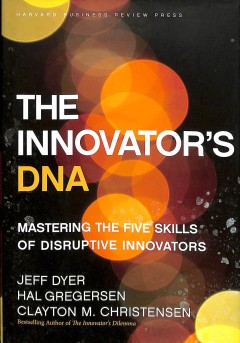
The innovator's DNA : mastering the five skills of disruptive innovators
You can be as innovative and impactful — if you can change your behaviors to improve your creative impact. In The Innovator’s DNA, authors Jeff Dyer, Hal Gregersen, and bestselling author Clayton M. Christensen (The Innovator’s Dilemma, The Innovator’s Solution) build on what we know about disruptive innovation to show how individuals can develop the skills necessary to move progressive…
- Edisi
- -
- ISBN/ISSN
- 978-1-4221-3481-8
- Deskripsi Fisik
- vi, 296 p, 24 cm; index
- Judul Seri
- -
- No. Panggil
- LC 658.4063 DYE t
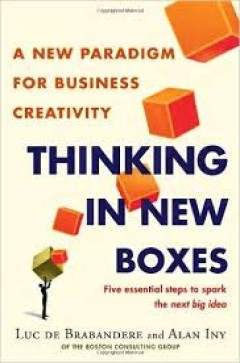
Thinking in new boxes : a new paradigm for business creativity
Thinking in New Boxes is a five-step guide that leverages the authors’ deep understanding of human nature to enable readers to overcome their limitations and both imagine and create their own futures. This book is a must-read for people living and working in today’s competitive environment.”Ray O. Johnson, Ph.D., chief technology officer, Lockheed Martin Thinking In New Boxes discusses …
- Edisi
- -
- ISBN/ISSN
- 978-0-8129-9295-3
- Deskripsi Fisik
- xiii, 330 p., ; illus : 23,5 cm ; index
- Judul Seri
- -
- No. Panggil
- LC 658.40714 BRA t
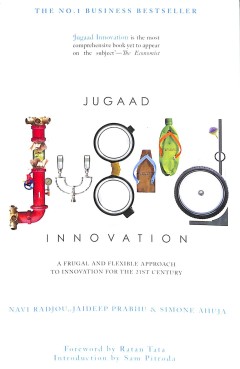
Jugaad innovation : a frugal and flexible approach to innovation for the 21st…
Jugaad innovation : a frugal and flexible approach to innovation for the 21st century
- Edisi
- -
- ISBN/ISSN
- 978-8-184-00205-8
- Deskripsi Fisik
- xvii, 317 p., ; illus L 23 cm
- Judul Seri
- Business Bestseller
- No. Panggil
- LC 650.1 RAD j
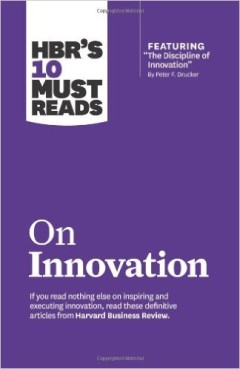
HBR's 10 Must Reads : On Innovation
If you read nothing else on inspiring and executing innovation, read these 10 articles. We?ve combed through hundreds of articles in the Harvard Business Review archive and selected the most important ones to help you innovate effectively. Leading experts such as Clayton Christensen, Peter Drucker, and Rosabeth Moss Kanter provide the insights and advice you need to: ? Decide which ideas are wo…
- Edisi
- -
- ISBN/ISSN
- 978-1-4221-8985-6
- Deskripsi Fisik
- v, 179p. ; 21cm.
- Judul Seri
- -
- No. Panggil
- TXT MG DRU h
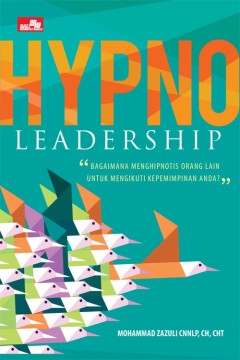
Hypno Leadership : bagaimana menghipnotis orang lain untuk mengikuti kepemimp…
RAHASIA DI BALIK SEMUA PEMIMPIN HEBAT
Pemimpin selalu dibutuhkan dan dipuja oleh banyak orang. Satu orang pemimpin bisa mengubah segalanya. Semua orang bisa menjadi pemimpin tapi tidak semua orang
bisa menjadi pemimpin yang hebat. Esensi kepemimpinan adalah untuk membuat orang lain bersedia melakukan apa yang Anda inginkan atas keinginannya sendiri. Buku ini akan menunjukkan kepada An…
- Edisi
- -
- ISBN/ISSN
- 978-602-02-6613-8
- Deskripsi Fisik
- xvi, 248 p., ; illus. : 21 cm
- Judul Seri
- -
- No. Panggil
- TXT LE ZAZ h

On natural selection
Throughout history, some books have changed the world. They have transformed the way we see ourselves—and each other. They have inspired debate, dissent, war and revolution. They have enlightened, outraged, provoked and comforted. They have enriched lives—and destroyed them. Now, Penguin brings you the works of the great thinkers, pioneers, radicals and visionaries whose ideas shook civili…
- Edisi
- -
- ISBN/ISSN
- 978-0-14-101896-6
- Deskripsi Fisik
- 116 p., 16 cm.
- Judul Seri
- -
- No. Panggil
- LC 153.2 DAR o

Innovation and dynamic capabilities in a traditional service sector Evidence …
The purpose of this paper is to analyse the types and the nature of innovations developed by small companies in a traditional service sector, as well as the ways that innovations impact their strategic capabilities.
- Edisi
- Vol. 6 No. 3, 2011 pp. 320-341
- ISBN/ISSN
- 1746-5265
- Deskripsi Fisik
- 24 p.
- Judul Seri
- Baltic Journal of Management
- No. Panggil
- ATC MR TSE i

THE IMPORTANCE OF TECHNOLOGICAL INNOVATION IN THE LOGISTICS OF ETHANOL EXPORTS
This paper analyzes the technological status of the bulk liquids logistical process at the port of Santos. The main objective is to identify problems encountered in port logistics for the export of ethanol and evaluate their respective technological innovation perspectives. Ethanol exports have increased given international environmental appeals. Within the complex and uncertain environments th…
- Edisi
- v. 3, n. 1, pp. 58 - 84, Jan./Jul. 2011
- ISBN/ISSN
- ISSN 2175-5825
- Deskripsi Fisik
- 27 p.
- Judul Seri
- -
- No. Panggil
- ATC LO PET t

Success in innovation implementation
Increasingly, how well organisations innovate is becoming the single most important issue in determining their ultimate success. Referen- cing a variety of cases primarily drawn from governmental organisations, this paper argues that the key to successful innovation imple- mentation rests on the convergence of three different factors. First, an innovation must be properly framed in terms of sta…
- Edisi
- Vol. 5, No. 4, 2001, pp. 341±359
- ISBN/ISSN
- 1363±254X
- Deskripsi Fisik
- 21P
- Judul Seri
- Journal of Communication Management
- No. Panggil
- ATC MG JOH s

Service innovation through dynamic knowledge management
The purpose of this paper is to report the findings of a study on the management of intellectual capital in Fortune Motors. It intends to highlight how an automobile service firm apply dynamic knowledge management concept to create new service processes which resulted in breaking through the bottleneck of profit loss
- Edisi
- Vol. 109 No. 3, 2009 pp. 322-337
- ISBN/ISSN
- 0263-557
- Deskripsi Fisik
- 19P
- Judul Seri
- Industrial Management & Data Systems
- No. Panggil
- ATC MG SHA s

Innovating business models and attracting different intellectual capabilities
When practicing innovation, attracting different intellectual capabilities (ICAs) is extremely important. The reasoning is that innovation necessitates different ICA that can think differently together. Continuous pressure on finding, attracting and applying ‘‘the right intellectual capability’’ related to the task is interesting. This article aims to examine how to attract and apply IC…
- Edisi
- VOL. 13 NO. 2 2009, pp. 17-24,
- ISBN/ISSN
- 1368-3047
- Deskripsi Fisik
- 10P
- Judul Seri
- Measuring Business Excellence
- No. Panggil
- ATC LE LIN i

Preliminary study on new container stacking/storage system due to space limit…
The purpose of this study is to introduce a new innovative means of container stacking/ storage as a potential solution for overcoming the lack of container yard space.
- Edisi
- Vol. 1 No. 1, 2016 pp. 21-39
- ISBN/ISSN
- 2397-3757
- Deskripsi Fisik
- 20P
- Judul Seri
- Maritime Business Review
- No. Panggil
- ATC PO RAH p

Categorization framework for systems innovation in EcoCities
With an increasing concern regarding climate change and the increasingly higher rate of urbanization worldwide, cities are expected to play a more important role in the future global energy system. Therefore, sustainable urban development projects, so-called EcoCities projects, are carried out globally. EcoCities are normally focusing on minimizing energy use and greenhouse gas emissions as wel…
- Edisi
- -
- ISBN/ISSN
- 1876-6102
- Deskripsi Fisik
- 6 p.
- Judul Seri
- ScienceDirect
- No. Panggil
- ATC PO LTZ c

Seaport CSR innovation for economic, social and environmental objectives
Seaports have gained importance in recent years, but they have also featured fundamental changes. For example, societal and environmental pressures have increased. As a consequence of these pressures, corporate social responsibility has gradually been introduced also in the ports sector. One of the impacts is at the level and type of innovation. The purpose of this paper is to focus on the way …
- Edisi
- VOL. 12 NO. 2 2016,
- ISBN/ISSN
- 1747-1117
- Deskripsi Fisik
- 16 p .
- Judul Seri
- Seaport CSR
- No. Panggil
- ATC MG VAN s

Fathoming Porter’s five forces model in the internet era
- Edisi
- VOL. 7 NO. 6 2005
- ISBN/ISSN
- 1463-6697
- Deskripsi Fisik
- 13 p.
- Judul Seri
- -
- No. Panggil
- ATC MG KAR f
- Edisi
- VOL. 7 NO. 6 2005
- ISBN/ISSN
- 1463-6697
- Deskripsi Fisik
- 13 p.
- Judul Seri
- -
- No. Panggil
- ATC MG KAR f

Disruption theory as a predictor of innovation success/failure
- Edisi
- Vol. 39 Iss 4 pp. 27 - 30
- ISBN/ISSN
- -
- Deskripsi Fisik
- 6 p.
- Judul Seri
- Strategy & Leadership
- No. Panggil
- ATC LE RAY d
- Edisi
- Vol. 39 Iss 4 pp. 27 - 30
- ISBN/ISSN
- -
- Deskripsi Fisik
- 6 p.
- Judul Seri
- Strategy & Leadership
- No. Panggil
- ATC LE RAY d

Making difference through marketing : a quest for diverse perspectives
- Edisi
- -
- ISBN/ISSN
- 978-981-10-0464-3
- Deskripsi Fisik
- xiv, 282 p.
- Judul Seri
- -
- No. Panggil
- TXT MG PLE m
- Edisi
- -
- ISBN/ISSN
- 978-981-10-0464-3
- Deskripsi Fisik
- xiv, 282 p.
- Judul Seri
- -
- No. Panggil
- TXT MG PLE m
Management in the digital age will China surpass sillicon valley
- Edisi
- -
- ISBN/ISSN
- 978-3-319-67489-6
- Deskripsi Fisik
- xv, 115 p.
- Judul Seri
- -
- No. Panggil
- TXT MG STE m
- Edisi
- -
- ISBN/ISSN
- 978-3-319-67489-6
- Deskripsi Fisik
- xv, 115 p.
- Judul Seri
- -
- No. Panggil
- TXT MG STE m

How to turn an innovative concept into a success? an application to seaport-r…
The main objective of this paper is ‘to assess the conditions, including policy support, under which innovative conceptshave a highchance ofgetting adoptedandbeingsuccessful’.Theworkwill start fromthe state-of-theart with the following goals targeted. Firstly, to identify the paths that newinnovative concepts usually follow, what key determinants are, which actors are involved, and what pol…
- Edisi
- -
- ISBN/ISSN
- 0739-8859
- Deskripsi Fisik
- 11 p.
- Judul Seri
- Research in Transportation Economics
- No. Panggil
- ATC PO ARD h

Logistics Innovation Development: A Micro-Level Perspective
Purpose – The purpose of this paper is to investigate the microfoundations of customer knowledge acquisition during logistics innovation development. Specifically, the authors explore the activities and behaviors of employees with customer contact (i.e. boundary-spanning employees (BSEs)) to deepen and broaden their knowledge about customers for the development of innovations. Design/meth…
- Edisi
- Vol. 45 Iss 4 pp
- ISBN/ISSN
- 0960-0035
- Deskripsi Fisik
- 22 p
- Judul Seri
- International Journal of Physical Distribution & Logistics Management
- No. Panggil
- ATC LO PED l

Organizational structure and logistics service innovation
The purpose of this paper is to examine how organizational structural factors (namely decentralization, formalization, and specialization) influence a firm's logistics service innovation capability and firm performance.
- Edisi
- Vol. 22 Issue: 1
- ISBN/ISSN
- -
- Deskripsi Fisik
- 29 p.
- Judul Seri
- The International Journal of Logistics Management
- No. Panggil
- ATC LO FER o

The paradox of logistics in Europe
The completion of the Single European Market in 1992 has major implications for logistics throughout the 1990s and beyond. However, as logistics has come under the spotlight, many managers and academics have come to realize that their understanding of the field is limited. In particular, both the differences in practice between countries and the future directions for innovation in logistics rem…
- Edisi
- Vol. 2 Issue: 2, pp.42-54
- ISBN/ISSN
- -
- Deskripsi Fisik
- 15 p.
- Judul Seri
- The International Journal of Logistics Management
- No. Panggil
- ATC LO COO t

Digital manufacturing-driven transformations of service supply chains for com…
The purpose of this paper is to explore the forms that combinations of digital manufacturing, logistics and equipment use are likely to take and how these novel combinations may affect the relationship among logistics service providers (LSPs), users and manufacturers of equipment.
- Edisi
- Volume 19 · Number 4 · 2014 · 421–430
- ISBN/ISSN
- -
- Deskripsi Fisik
- 12 p.
- Judul Seri
- Supply Chain Management: An International Journal
- No. Panggil
- ATC LO PAR d

Collaboration and networking in the process of innovation: the path to precis…
The purpose of this paper is to examine the process of innovation management in the eighteenth century in the context of the search for precision time keeping in the watch making industry. In particular it looks at how knowledge was managed and transferred among interested stakeholders in the process
- Edisi
- Vol. 19 Iss 2 pp. 167 - 188
- ISBN/ISSN
- -
- Deskripsi Fisik
- 24 p.
- Judul Seri
- Journal of Management History
- No. Panggil
- ATC MG PRO c

Logistics innovation: a literature-based conceptual framework
The purpose of this paper is to develop a model of logistics innovation based on previous studies in the logistics literature and recommend opportunities for further research.
- Edisi
- Vol. 20 No. 3, 2009
- ISBN/ISSN
- -
- Deskripsi Fisik
- 22 p.
- Judul Seri
- The International Journal of Logistics Management
- No. Panggil
- ATC LO GRA l

Logistics innovation: a literature-based conceptual framework
The purpose of this paper is to develop a model of logistics innovation based on previous studies in the logistics literature and recommend opportunities for further research.
- Edisi
- Vol. 20 No. 3, 2009 pp. 360-377
- ISBN/ISSN
- -
- Deskripsi Fisik
- 22 p.
- Judul Seri
- The International Journal of Logistics Management
- No. Panggil
- ATC LO GRA l

Logistics innovation in the film manufacturing industry
Presents a case study of a production seat booking system for the photographic color film manufacturing industry. This manufacturing process is a hybrid flow shop, which consists of two manufacturing stages: first, processing of the film bulk‐rolls in batches, and second, packing of the final product specifications in a continuous‐process line. A production seat booking system is a new sche…
- Edisi
- Vol. 11 Issue: 2, pp.121-127
- ISBN/ISSN
- -
- Deskripsi Fisik
- 8 p.
- Judul Seri
- Integrated Manufacturing Systems
- No. Panggil
- ATC LO TSU l

Predicting the organisational adoption of B2C e-commerce: an empirical study
Using the literature on innovation research, this paper proposes to establish and empirically test a prediction model which consists of four major factors in the adoption of online retailing by organisations, namely relative advantage, competitive pressure, channel conflict and technical resource competence.
- Edisi
- Vol. 106 No. 8, 2006 pp. 1133-1147
- ISBN/ISSN
- -
- Deskripsi Fisik
- 18 p.
- Judul Seri
- Industrial Management & Data Systems
- No. Panggil
- ATC LO NGA p

The role of customer relations for innovativeness and customer satisfaction: …
The purpose of this paper is to provide insights into commonalities and differences of service innovation across industries. The compared sectors are logistics service providers and IT service providers (SPs).
- Edisi
- Vol. 26 No. 2, 2015
- ISBN/ISSN
- -
- Deskripsi Fisik
- 23 p.
- Judul Seri
- The International Journal of Logistics Management
- No. Panggil
- ATC LO WALL t

Governing for innovation in horizontal service cooperations
The purpose of this study is to provide insights into the role of governance mechanisms in fostering innovativeness in horizontal service cooperations.
- Edisi
- Vol. 23 No. 2, 2012 pp. 279-302
- ISBN/ISSN
- -
- Deskripsi Fisik
- 26 p.
- Judul Seri
- Journal of Service Management
- No. Panggil
- ATC LO SCH g

Innovation management of logistics service providers: Foundations, review, an…
The purpose of this paper is to provide a sound basis to facilitate further research on innovation management at logistics service providers (LSPs).
- Edisi
- Vol. 41 No. 2, 2011 pp. 187-218
- ISBN/ISSN
- -
- Deskripsi Fisik
- 34 p.
- Judul Seri
- International Journal of Physical Distribution & Logistics Management
- No. Panggil
- ATC LO BUR i

Conflict and its governance in horizontal cooperations of logistics service p…
Horizontal cooperations of logistics service providers (LSPs) have becomeimportant for LSPs within the last decades.Owing to the high complexity of these cooperations as observed by Schmoltzi and Wallenburg, the potential for conflict is inherent. This research, therefore, aims to investigate how nature (dysfunctional vs functional) and extent of conflict impact the outcome of these cooperation…
- Edisi
- Vol. 41 No. 4, 2011 pp. 385-400
- ISBN/ISSN
- -
- Deskripsi Fisik
- 18 p.
- Judul Seri
- International Journal of Physical Distribution & Logistics Management
- No. Panggil
- ATC LO RAU c

Supply chain relationships as a context for learning leading to innovation
The purpose of this paper is to integrate the literature on learning in the context of boundary spanning innovation in supply chains. A two-dimensional framework is proposed: the learning stage (exploration, assimilation, exploitation) and the learning facet (structural, cultural, psychological and policy). Supply chain management (SCM) practices are examined in light of this framework and prop…
- Edisi
- Vol. 26 No. 3, 2015
- ISBN/ISSN
- -
- Deskripsi Fisik
- 27 p.
- Judul Seri
- The International Journal of Logistics Management
- No. Panggil
- ATC LO KNO s

Logistics innovation process revisited: insights from a hospital case study
The purpose of this paper is to learn more about logistics innovation processes and their implications for the focal organization as well as the supply chain, especially suppliers.
- Edisi
- Vol. 41 No. 6, 2011
- ISBN/ISSN
- -
- Deskripsi Fisik
- 26 p.
- Judul Seri
- International Journal of Physical Distribution & Logistics Management
- No. Panggil
- ATC LO LAN l

Diffusion of green supply chain management: Examining perceived quality of gr…
Extant research has yielded conflicting results regarding the relationship between adoption of green supply chain management (GSCM) practices and competitive advantage. The purpose of this paper is to further investigate this relationship by examining the case of green reverse logistics (GRL).
- Edisi
- Vol. 22 No. 3, 2011 pp. 373-389
- ISBN/ISSN
- -
- Deskripsi Fisik
- 20 p.
- Judul Seri
- The International Journal of Logistics Management
- No. Panggil
- ATC LO HAN d

Logistics innovation in seaports: an inter-organizational perspective
Innovation has become the most important driver of firm competitiveness in advanced economies. In today's competitive environment, firms need to complement technological innovation with non-technological innovation concerning services, people and organization in order to survive and prosper. It is widely acknowledged that innovations emerge in social interactions in which diverse actors share c…
- Edisi
- -
- ISBN/ISSN
- -
- Deskripsi Fisik
- 11 p.
- Judul Seri
- -
- No. Panggil
- ATC PO MAR l
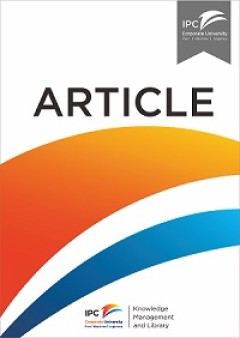
Corporate governance and innovative leaders
The purpose of this paper is to attract readers’ attention to the importance of the integration of corporate governance and innovation for companies to strive further in business. The paper also attempts to illustrate how an innovation champion can exist in companies with a good corporate governance structure and fully utilize the structure, at the same time being aware of the limitations of …
- Edisi
- VOL. 4 NO. 1/2 2008, pp. 34-40,
- ISBN/ISSN
- 1747-1117
- Deskripsi Fisik
- 8 p.
- Judul Seri
- Social Responsibility Journal
- No. Panggil
- ATC LE MUS c

Experimental assessment of an innovation knowledge system for decision support
Purpose – Today, a second generation of computer-based innovation tools employs knowledge systems technology to automate and support key intellectual activities required for effective process design. But a central question remains as to the effectiveness of innovation through such knowledge systems. The research described in this paper is focused on testing the effectiveness of knowledge-base…
- Edisi
- Vol. 11 Iss 5 pp. 444 - 475
- ISBN/ISSN
- -
- Deskripsi Fisik
- 34 p.
- Judul Seri
- Business Process Management Journal
- No. Panggil
- ATC MR NIS e

Innovation in social economy firms
This study aims to examine whether the determinant factors of innovations broadly accepted for traditional firms – the personal traits of the entrepreneurs, the features of the firms and the environment – also influence innovation in social economy companies.
- Edisi
- Vol. 51 No. 5, 2013 pp. 986-998
- ISBN/ISSN
- -
- Deskripsi Fisik
- 15 p.
- Judul Seri
- Management Decision
- No. Panggil
- ATC LO GUZ i

Assessment of technological innovations in patenting for 3rd party logistics …
To analyse logistical innovations from 1984 to 2003.
- Edisi
- Vol. 19 No. 5, 2006 pp. 504-524
- ISBN/ISSN
- -
- Deskripsi Fisik
- 23 p.
- Judul Seri
- Journal of Enterprise Information Management
- No. Panggil
- ATC LO CHU a

Reverse logistics information system success and the effect of motivation
Information systems (IS) play a substantial role in managing reverse logistics (RL) processes. However, the RL literature rarely takes a holistic approach to examining the “success” of IS employment. Drawing on the rich literature base from the IS field, the authors explore IS Success theory in the context of RL. Considering Diffusion of Innovation theory, the authors also examine the effec…
- Edisi
- Vol. 44 No. 3, 2014
- ISBN/ISSN
- -
- Deskripsi Fisik
- 22 p.
- Judul Seri
- International Journal of Physical Distribution & Logistics Management
- No. Panggil
- ATC LO HAN r

Task-technology fit for reverse logistics performance
Information technology is a key enabler of logistics performance. Unfortunately, most logistics information systems are implemented with forward logistics processes in mind, with little, if any, consideration for the reverse channel. Informed by task‐technology fit theory, the authors aim to explore how use of complementary information technologies to support reverse logistics processes can l…
- Edisi
- Vol. 24 Issue: 2, pp.230-246
- ISBN/ISSN
- -
- Deskripsi Fisik
- 18 p.
- Judul Seri
- The International Journal of Logistics Management
- No. Panggil
- ATC LO HUS t

The relationship between technology and logistics third-party providers
Our work discusses the results of a survey among French logistics service providers. In a highly competitive context characterized by "time compression", technological effort becomes a key variable and a means of differentiation between third-party logistics providers. The success of logistics outsourcing relationships is entrenched in the third-party’s technological ability to improve the su…
- Edisi
- Vol. 33 No. 3, 2003 pp. 236-253
- ISBN/ISSN
- -
- Deskripsi Fisik
- 22 p.
- Judul Seri
- International Journal of Physical Distribution & Logistics Management
- No. Panggil
- ATC LO SAU t

The drug logistics process: an innovative experience
The purpose of this paper is to present the latest innovations in the drug distribution processes of hospital companies, which are currently dealing with high inventory and storage costs and fragmented organizational responsibilities.
- Edisi
- Vol. 27 No. 2, 2015 pp. 214-230
- ISBN/ISSN
- -
- Deskripsi Fisik
- 19 p.
- Judul Seri
- The TQM Journal
- No. Panggil
- ATC LO MAR t

Predicting SMEs' adoption of enterprise systems
The purpose of this paper is to develop a model that can be used to predict which small to medium-sized enterprises (SMEs) are more likely to become adopters of enterprise systems (ERP, CRM, SCM and e-procurement).
- Edisi
- Vol. 22 No. 1/2, 2009 pp. 10-24
- ISBN/ISSN
- -
- Deskripsi Fisik
- 19 p.
- Judul Seri
- Journal of Enterprise Information Management
- No. Panggil
- ATC LO RAM p

National factor effects on firm competitiveness and innovation
The purpose of this article is to investigate how national-level characteristics such as country wealth, a floating exchange rate and European Union (EU) membership influence firm-level perceptions of competition and firm-level innovation. Greater understanding of these relationships can promote more effective policymaking as well as add to the existing academic conversation regarding national …
- Edisi
- Vol. 25 No. 4, 2015 pp. 392-409
- ISBN/ISSN
- -
- Deskripsi Fisik
- 20 p.
- Judul Seri
- Competitiveness Review
- No. Panggil
- ATC LO TRO n

Innovation management education for multicultural organisations: challenges a…
This paper aims to discuss ways for fostering innovation management and innovation in management education sensitive to cultural diversity. It explores strands in the literature concerning cross‐cultural awareness and undertakes a case study, carried out in a multicultural organisation, aimed at pinpointing challenges faced by managers working in such environments. Argues that logistics cou…
- Edisi
- Vol. 5 Issue: 2, pp.73-85
- ISBN/ISSN
- -
- Deskripsi Fisik
- 14 p.
- Judul Seri
- European Journal of Innovation Management
- No. Panggil
- ATC LO CAN i

Firm newness, product novelty and aesthetic failure
The purpose of this paper is to examine product failures in the consumer technology products industry to explain why some firms experience more aesthetic-related failures than others.
- Edisi
- Vol. 52 No. 10, 2014 pp. 1952-1967
- ISBN/ISSN
- -
- Deskripsi Fisik
- 17 p.
- Judul Seri
- Management Decision
- No. Panggil
- ATC LO SRI f

Factors affecting innovation in logistics technologies for logistics service …
With the fast growth in China’s economy and China’s accession into WTO, the demand for logistics services has been growing significantly in China. China’s logistics service providers need to pay more attention to adopt more efficient logistics technologies to provide better services for their customers. The purpose of this paper is to study the factors affecting the innovation in logistic…
- Edisi
- Vol. 2 No. 1, 2007 pp. 22-37
- ISBN/ISSN
- -
- Deskripsi Fisik
- 18 p.
- Judul Seri
- Journal of Technology Management in China
- No. Panggil
- ATC LO LIN f

Exploring the performance effects of key-supplier collaboration: an empirical…
To examine the conditions under which the proposed benefits of collaboration between a firm and its suppliers will occur.
- Edisi
- Vol. 35 No. 6, 2005 pp. 445-461
- ISBN/ISSN
- -
- Deskripsi Fisik
- 23 p.
- Judul Seri
- International Journal of Physical Distribution & Logistics Management
- No. Panggil
- ATC LO FEL e
 Karya Umum
Karya Umum  Filsafat
Filsafat  Agama
Agama  Ilmu-ilmu Sosial
Ilmu-ilmu Sosial  Bahasa
Bahasa  Ilmu-ilmu Murni
Ilmu-ilmu Murni  Ilmu-ilmu Terapan
Ilmu-ilmu Terapan  Kesenian, Hiburan, dan Olahraga
Kesenian, Hiburan, dan Olahraga  Kesusastraan
Kesusastraan  Geografi dan Sejarah
Geografi dan Sejarah